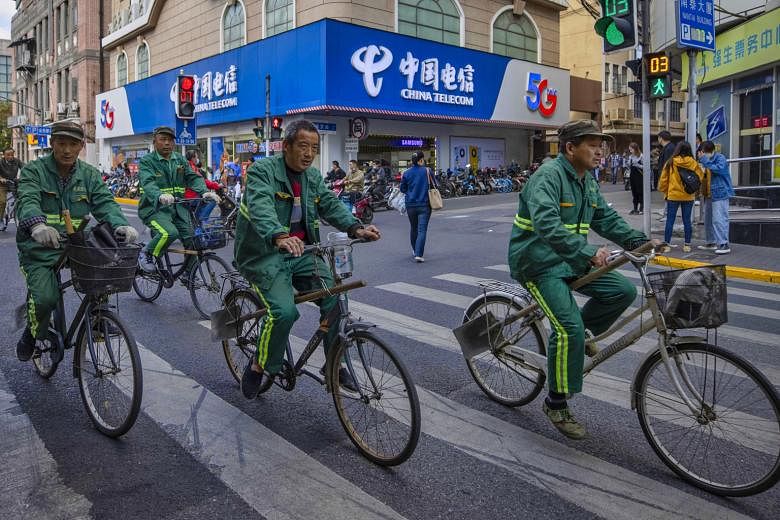WASHINGTON • US President Donald Trump signed an order barring American investments in Chinese firms owned or controlled by the military, the latest White House bid to pressure Beijing over what it views as abusive business practices.
China is "increasingly exploiting" American capital for "the development and modernisation of its military, intelligence, and other security apparatuses", posing a threat to the United States, according to the executive order signed on Thursday.
The order prohibits investment firms and pension funds from buying and selling shares of 20 Chinese companies designated in June by the Pentagon as having military ties, as well as an additional 11 companies added in August.
The list includes prominent Chinese technology, manufacturing and infrastructure firms, such as China Mobile Communications, China Telecommunications, Huawei, Sinochem, Hangzhou Hikvision Digital Technology, China Railway Construction, Inspur Group and Aviation Industry Corporation of China. Shares of some firms - including China Mobile and China Telecom - tumbled upon the latest news.
The Chinese Foreign Ministry accused the US of "viciously slandering" its military-civilian integration policies and vowed to protect the country's companies.
"This not only severely harms the legitimate rights and interests of Chinese companies, but also the interests of foreign investors including US ones," ministry spokesman Wang Wenbin told a regular briefing, urging that the order be withdrawn.
Relations between the US and China are expected to remain rocky despite Mr Trump's defeat to Democrat Joe Biden in the presidential election last week.
The Trump administration has continued to follow through on vows to punish Beijing over the coronavirus pandemic, its treatment of Muslim minorities and the crackdown on dissent in Hong Kong.
Yesterday, China also officially extended congratulations to Mr Biden on his election victory. Beijing had been one of the last holdouts as Mr Trump mounted an unlikely battle to contest the results.
Chinese officials have threatened to respond to previous Trump administration actions with their own blacklist of US companies.
Associate professor of Chinese politics Liu Dongshu, at the City University of Hong Kong, said Beijing would likely shrug off such "symbolic" provocations while it waits to see what kind of policy the Biden administration will put into place.
"For those who are clearly owned by the military, they don't have a lot to do with the US," Prof Liu said.
"China is waiting for Trump to step down. It will avoid being too sensitive - be calm and don't overreact - to any of Trump's actions towards China as his term winds down."
The latest prohibition will go into effect on Jan 11, and allows US investment firms and pension funds to divest their holdings in companies linked to the Chinese military over the next year.
If the US determines that additional companies have military ties in the future, American investors will be given 60 days from that determination to divest.
US National Security Adviser Robert O'Brien said in a statement that many of the companies at issue were traded on exchanges around the world. American investors could unknowingly provide funds through passive investments such as mutual funds and retirement plans, he added.
The order "serves to protect American investors from unintentionally providing capital that goes to enhancing the capabilities of the People's Liberation Army and People's Republic of China intelligence services", Mr O'Brien said.
BLOOMBERG, NYTIMES

